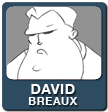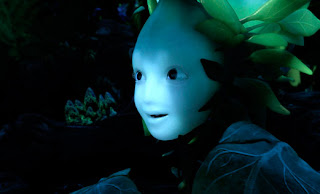Studio Etiquette: Keep your Ego in check
By: Jamy Wheless, Mentor,
AnimationMentor.com
What makes a good animator? Is it getting great poses? Understanding timing? Paying attention to arcs? How about being a good actor? Actually, it's all of this and more. But one of the key ingredients not discussed often enough is having a positive attitude and being able to work with others.
I've worked with very talented animators whose egos have hurt their careers. The mindset of, "I deserve this or that" or "I don't need to work with a team - I can do it on my own" will eventually lead to no job. Lou Holtz once said, "All life is -- whether it's in a job or a home or on a football team -- is getting other people what they need." Plain and simple.
The Director needs an Animation Supervisor to listen and get him what he wants in a shot. The Animation Supervisor needs the animator to deliver a great performance that helps tell the story. The animator needs to collaborate with other animators and be open to suggestions to do his best work. The animator needs to be able to take constructive criticism from others. The animator needs technical support to help him animate faster and get the job done on time.
It takes a team of people to get each other what they need.
In order to improve and become a better animator one needs to set the ego aside and be open to learning something new every day. My friend and I have a saying at work, "Is it about you or is it about the work?" In other words, are you giving your all for a bigger cause or are you more concerned about yourself and what you get out of it.
So how do we keep our egos in check and become better animators each day? It all begins with the right attitude. My own work began to improve when I made a decision years ago to have a positive attitude regardless of the circumstances. I made a conscious decision to keep a positive attitude and to influence others every day. Over time, my work habits improved and I looked forward to going to work and serving others. It takes a daily commitment to keep my attitude right through the course of a week. When my attitude turns negative, which can easily happen, I have to check myself and ask the question, "Is it about YOU or the work?" Usually when this happens, it's more about my ego and what I want rather than what the team needs.
Another rule to live by is to treat others the way you want to be treated. Living by this rule helps me focus in on each person and then as I imagine if I were them I ask myself, "What can I do that would help them get what they need to be successful?" Since animation is a team effort, by applying this rule to your daily routine you not only inspire others but you'll find yourself more inspired as you do your work. It becomes contagious and before long everyone's work has improved.
In summary, I've realized that the right attitude is more important than all the talent in the world. My personal belief is 20% talent and 80% attitude will take you far in life. You have a choice everyday regarding your attitude and how you conduct yourself. Believe you can improve yourself and become that person you desire to be. Ralph Waldo Emerson once said, "What lies behind us and what lies before us are tiny matters compared to what lies within us."
Change your mindset and have the right attitude and great things will come.
This article was brought to you by
AnimationMentor.com, The Online Animation SchoolTM .
 Critiques & Opinions
Critiques & Opinions
Often in animation we are subjected to critiques -- most likely daily. I try to impress on my students the importance of learning all the principals of animation, but temper it with a bit of realism. It's a simple fact that everyone has an opinion, and no matter how good you are or how long you've been working there is always something new to learn. So seek out criticism, or take any thrown your way. Take what everyone says... Weigh it against what you've learned up to that point, and if a particular problem, or complement keeps cropping up, there must be some truth too it.
I’m sure we've all met someone who isn't crazy about our work for one reason or another.... but that doesn't mean you can't get something from their opinion. It's kinda like learning to fight... The more you mess up, the more you learn what not to do.
Animation is an art form, and as artists we all have our own sense of aesthetics. Don't take criticism as a punch to the gut -- most likely it isn't personal. Strive to do your best work, and remember it isn't your show/game. You are providing a service. If a director wants something, and you think it’s a bad decision or a problem, make it known to your supervisor or animation director, but don't fight it. If they elect to follow your opinion great, you’re a hero for pointing it out. If not don't latch on like a pit bull, leave it at that and do the best you can given the constraints. I think that makes a good honest animator: you are showing that you recognize issues, care about your work, and confront them head on, but are still a team player.
Technique
As a student learning animation, which most of us are until the day we kick the big one, we meet lots of other people doing the same work...yet everyone seems to have their own flavor of "How to do it?" What I like to do personally, and also tell my students is, whomever is currently teaching you is who you listen too.
In other words, if you are in school do what any given teacher tells you at that time -- learn what they have to give. When you move on from them, do the same with the next teacher. "But everyone does it differently, won't it get confusing?" Ahhh ...no, what you are doing is focusing on what you have to learn...not looking down the road.
Before you know it, you will have picked up a ton of knowledge and techniques, the next step is deciding what works for you and what doesn't.
This is where each animator, like some home brew from Grannies barn, picks their ingredients and heads off into the world. The only difference in animation is as we work with new director, supervisors, and animators.... we are constantly show different ways of the force. Take that ever-growing list and give it a fair tryout and see if you can incorporate it into your working method. Maybe it speeds you up, maybe it slows you down, maybe your work jumps to that next plateau. It's a simple fact that you will grow, and improve as an animator always but it won't be a simple strait shot to the goal.
 The creators of the most astounding visual story have come together to present the tutorial to the making of 'Descendants'. Done as a final year project at the Filmakademie, this has been on the festival circuit for a year or so. Click the image...
The creators of the most astounding visual story have come together to present the tutorial to the making of 'Descendants'. Done as a final year project at the Filmakademie, this has been on the festival circuit for a year or so. Click the image...

